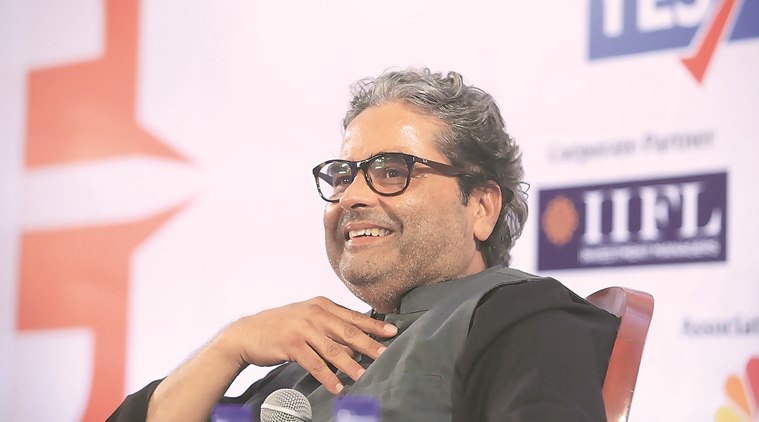"Psychosis of fear, if you say
something, you will be personally
targeted like Gauri Lankesh.
We have seen the way she was killed,"
says Bhardwaj.
 “There is a psychosis of fear. If you say something, you will be personally targeted. We have seen that in the way Gauri Lankesh was killed. Bollywood can be just an entertainment form for you, but it’s bread and butter for us.”
“There is a psychosis of fear. If you say something, you will be personally targeted. We have seen that in the way Gauri Lankesh was killed. Bollywood can be just an entertainment form for you, but it’s bread and butter for us.”
That was one of Bollywood’s most political filmmakers, Vishal Bhardwaj, opening up at the Express Adda Friday on why the industry hesitates to speak up when political controversies impact mainstream films such as Ae Dil E Mushkil, which faced calls for bans due to the casting of a Pakistani actor, and Padmaavat, which withstood protests for its portrayal of Rajput queen Padmavati.
“If we have spent Rs 40 crore on a film and then, one week or three days before, you start an agitation, the cost becomes Rs 140 crore before the film is released. They hit you where it hurts the most,” Bhardwaj said.
Referring to Charlie Chaplin’s The Great Dictator, he said, “When Charlie Chaplin showed Hitler playing football with a globe, he had a lot of money. What I am saying is that even if I had that kind of money, maybe I would not have that much courage. We never felt like this before. I am not saying that I liked the previous governments or I prefer one party over another. I have seen genocides by both governments. I was in Hindu College (Delhi) when the 1984 (anti-Sikh) riots broke out. I still feel pained about that. So, as an artiste, we take no sides. We take the side of the right and this I have always said, one who is not left is it is also the story of India and Pakistan. In Haider, he dwelt on the politics of conflict in the Valley. In Omkara, he went into the underworld.
The filmmaker revealed that he was fascinated by Krzysztof Kieslowski’s films in which “the conflict is so strong that, even if the characters are not speaking and the film is very silent, you are on the edge of your seat”.
“The role of film is a mirror to society, which should be the work of the media,” he said. But present-day journalism, he said, feels like a “comedy show, it’s like a comedy circus”. “When you see Arnab (Goswami of Republic TV) is screaming on the screen, initially it feels like you can’t see it and watch through, and then you start enjoying it,” he said.
Responding to a question, Bhardwaj agreed that journalism may have usurped the role of films. “Perhaps, we should become more real and matter of fact, and tell the truth, for a change,” he said.
According to Bhardwaj, documentary films and Bollywood movies, such as ‘Udta Punjab’, speak about social realities. “Then, the Censor Board says change the name of Punjab in Udta Punjab but the judiciary allows the film to be released. Anyway, we are considered as bhand (entertainers). We are a part of the Information and Broadcasting Ministry and not Ministry of Culture. We are entertainers, who never used to be taken seriously until recently,” he said.
Growing up in Meerut, Bhardwaj has travelled an arc, from a children’s film called Makdee in 2002 to the thriller 7 Khoon Maaf in 2011, to a black comedy Matru Ki Bijlee Ka Mandola in 2013.
He has imbued hard-hitting stories with lyricism in films such as Kaminey (2009) and relocated William Shakespeare’s plays into Indian conflict settings — Maqbool (2003), Omkara (2006) and Haider (2014). He has also produced Ishqiya (2010) and Dedh Ishqiya (2014), among others.
In his films, he said, he tried to tell the story “from inside out, from the locals’ point of view rather than the filmmaker’s”.
Omkara, adapted from Othello, he said, was based on the people he has met. “I have seen street fights. I have seen gang lords and gang wars. I left Meerut in 1990 and I went back in 2005 to research for Omkara and I found things were exactly the same, in fact, even worse,” he said.
In the case of Haider, Bhardwaj said he stayed with Kashmiris in Anantnag to capture their lives and how they talk. “It was fun to catch these nuances,” said Bhardwaj who, while talking about his love for music and ghazals, sang a few lines of Bhupinder Singh’s popular ghazal Dil Dhoondta Hai.

No comments:
Post a Comment